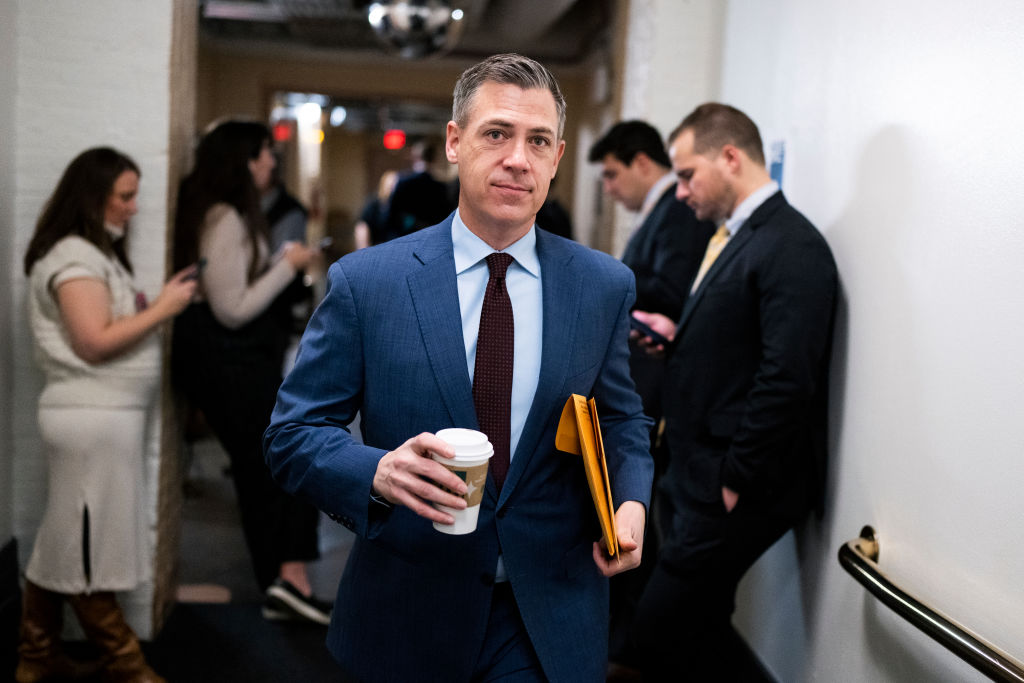Club for Growth President David McIntosh took credit Monday for former Indiana Gov. Mitch Daniels’ decision not to run for Senate in 2024. The 73-year-old, former two-term governor’s move came after the anti-tax organization’s super PAC, Club for Growth Action, pledged to spend millions on GOP Rep. Jim Banks’ behalf if Daniels decided to challenge him for retiring Sen. Mike Braun’s seat.
“In Indiana, we endorsed Jim Banks, and did a sort of hit ad on Mitch Daniels to signal to him: If he did get in it would be a real race,” McIntosh told reporters.
The Club for Growth’s early involvement in Indiana’s Republican Senate primary is a preview of its 2024 Senate strategy: spend millions in races boosting economic conservatives in Republican primaries.
The organization is actively recruiting candidates in Montana and West Virginia, two battlegrounds former President Donald Trump carried by double-digit margins in 2020 (and where incumbent Democratic Sens. Jon Tester and Joe Manchin are considered especially vulnerable). Club for Growth’s investment could hit seven figures in each state: It spent more than $38 million in Republican Senate primaries during the 2022 cycle, according to the group’s spokesman Joe Kildea.
McIntosh vowed to back Rep. Matt Rosendale in Montana’s Republican Senate primary in 2024 should the congressman decide to throw his hat in the ring against Tester next cycle. (Tester beat Rosendale by 3.5 points in 2018.)
“Rosendale is someone we supported last time against Tester,” McIntosh said, adding that the group supported Rosendale’s initial push for concessions from Kevin McCarthy during last month’s 15-ballot speakership battle.“If he decides to run, we’d want to support him again.”
Other prospective GOP Senate candidates include Rep. Ryan Zinke and Montana’s Attorney General Austin Knudsen.
In West Virginia, the picture is murkier. GOP Rep. Alex Mooney is the only declared challenger, but Republican Attorney General Patrick Morrisey and GOP Gov. Jim Justice are looking at the race too. McIntosh said the group will likely choose between Morrisey and Mooney over Justice, a former Democrat who switched his party affiliation to Republican in 2017 and whom McIntosh described as a “moderate.”
“If there are two conservatives, it’s a precarious situation where they’re going to cancel each other out and the moderate would win, so we’re going to wait and see if they’re both running and then make a final call on that,” McIntosh said.
By contrast, the organization is currently adopting a more passive approach in bluer states like Michigan, which Trump narrowly carried in 2016 but lost by three points in 2020, and where no Republican has won a Senate race since 1994. The Dispatch first reported this week that former Congressman Peter Meijer and GOP Reps. Bill Huizenga and Lisa McClain are considering running for retiring Democratic Sen. Debbie Stabenow’s seat.
McIntosh said the group is waiting to see whether Club-aligned candidates emerge in Michigan’s GOP Senate primary but acknowledged that a more centrist Republican nominee may give the GOP a better chance of retaking Senate Democrats’ 51-seat majority. If that calculus pans out, then the Club will direct its investments elsewhere.
“It may be that Peter Meijer’s the best candidate for Republicans to win the seat, but he might not have that good a score on our scorecard,” McIntosh said. “So we would then strategically say: ‘Let’s just stay out.’”
McIntosh described a shift in the Club’s approach to Republican primaries in recent years from when he first came on board during the Tea Party era, when the group’s strategy was often to oppose candidates favored by Republican leadership at all costs.
That shift was evident in the Club for Growth’s approach to McCarthy’s speakership fight last month. After initially opposing his candidacy, the Club pledged to support his speakership bid on the condition that the McCarthy-aligned Congressional Leadership Fund stopped spending money in Republican House primaries in safe districts.
It remains to be seen whether and where the Club will clash with Senate Republican spending organizations, namely Mitch McConnell-aligned Senate Leadership Fund and the National Republican Senatorial Committee (NRSC). Both McConnell and NRSC Chairman Steve Daines have signaled that they will play an active role in endorsing and financially backing candidates whom they view as being competitive in a general election.
Last cycle, the Club for Growth endorsed Sens. Mike Lee of Utah, Rand Paul of Kentucky, and Ted Budd in North Carolina, as well as failed Senate candidates Adam Laxalt in Nevada, Josh Mandel in Ohio, Kathy Barnette in Pennsylvania, and Mo Brooks in Alabama. (SLF spent heavily against Brooks in Alabama’s Senate GOP primary.)
For now, the Club for Growth is highlighting party unity with respect to Indiana. Soon after Daniels bowed out of the race, Trump and the NRSC endorsed Banks.
But on the presidential level, the Club for Growth is expected to clash this cycle with Trump, whom it supported in 2016 after initially opposing him. This time around, the Club for Growth is actively recruiting candidates early in the cycle.
The group invited Florida Gov. Ron DeSantis, former South Carolina Gov. and former U.N. Ambassador Nikki Haley, former Vice President Mike Pence, Virginia Gov. Glenn Youngkin, and South Carolina Sen. Tim Scott to make their case to the organization at a retreat with donors next month. The group didn’t extend an invitation to Trump, inviting backlash from the former president on Tuesday.
“If he gets the nomination we’ll help him try to win,” McIntosh said Monday. “But the last three elections show that he’s lost.”







Please note that we at The Dispatch hold ourselves, our work, and our commenters to a higher standard than other places on the internet. We welcome comments that foster genuine debate or discussion—including comments critical of us or our work—but responses that include ad hominem attacks on fellow Dispatch members or are intended to stoke fear and anger may be moderated.
With your membership, you only have the ability to comment on The Morning Dispatch articles. Consider upgrading to join the conversation everywhere.